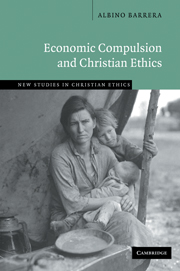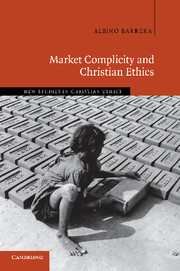Economic Compulsion and Christian Ethics
Part of New Studies in Christian Ethics
- Author: Albino Barrera, Providence College, Rhode Island
- Date Published: November 2007
- availability: Available
- format: Paperback
- isbn: 9780521043571
Paperback
Other available formats:
Hardback, eBook
Looking for an inspection copy?
This title is not currently available on inspection
-
Markets can often be harsh in compelling people to make unpalatable economic choices any reasonable person would not take under normal conditions. Thus, workers laid off in mid-career accept lower-paid jobs that are beneath their professional experience for want of better alternatives. Economic migrants leave their families and cross borders (legally or illegally) in search of a livelihood. These are examples of economic compulsion. These economic ripple effects have been virtually ignored in ethical discourse because they are generally accepted to be the very mechanisms that generate the market's much-touted allocative efficiency. Albino Barrera argues that Christian thought on economic security offers an effective framework within which to address the consequences of economic compulsion.
Read more- Barrera addresses the adverse effects of market operations on individuals from the viewpoint of Christian ethics
- The author provides a Christian perspective on the community's duty to support those lacking economic security
- Clearly written by an author qualified in both economics and theology, it is a timely contribution to an increasingly lively area of interdisciplinary debate
Reviews & endorsements
'… this is an important book on a very timely subject … it is the engagement with the world outside religion which gives the book real credibility.' Church Times
See more reviews'… an impressive addition to this series … This book sets a high standard for those working on the interface of theology and economics.' Journal of Theological Studies
'This is a very detailed and technically demanding analysis of the arguments surrounding the concept 'economic compulsion'. … a tightly argued piece of work that depends on knowledge of moral philosophy, economics, scripture and contemporary discussion of human rights. Work of this intellectual rigour makes much writing on social ethics look … amateurish … This book makes a powerful case for the duty of Christians to respond to the continuing imperative of being the agents of divine providence in economic insecurity. It also is a good example of how moral theology can be informed by a cosmology that allows human beings freedom of action as the means by which their moral formation is secured.' Ecclesiology
'This volume is an extremely important one - one of the very best on Christian economic ethics.' Journal of Markets & Morality
'… this book … is well worth the effort, deeply instructive as it is about matters with which we should all be concerned …' Heythrop Journal
Customer reviews
Not yet reviewed
Be the first to review
Review was not posted due to profanity
×Product details
- Date Published: November 2007
- format: Paperback
- isbn: 9780521043571
- length: 268 pages
- dimensions: 229 x 153 x 17 mm
- weight: 0.411kg
- contains: 1 b/w illus.
- availability: Available
Table of Contents
General editor's preface
Preface
Part I. The Nature and Dynamics of Economic Compulsion:
1. Markets and coercive pecuniary externalities
2. The regressive incidence of unintended burdens
Part II. Setting the Moral Baseline and Shaping Expectations:
3. Economic security as God's twofold gift
4. Retrieving the biblical principle of restoration
Part III. Contemporary Appropriation:
5. Economic rights-obligations as diagnostic framework
6. Application: the case of agricultural protectionism
7. Summary and conclusions
References
Index.
Sorry, this resource is locked
Please register or sign in to request access. If you are having problems accessing these resources please email [email protected]
Register Sign in» Proceed
You are now leaving the Cambridge University Press website. Your eBook purchase and download will be completed by our partner www.ebooks.com. Please see the permission section of the www.ebooks.com catalogue page for details of the print & copy limits on our eBooks.
Continue ×Are you sure you want to delete your account?
This cannot be undone.
Thank you for your feedback which will help us improve our service.
If you requested a response, we will make sure to get back to you shortly.
×




